Closing the Nursing Gap
Across Louisiana, universities, hospitals, and nonprofits are meeting a critical nursing shortage by collaborating in radically effective ways.

At the height of the COVID-19 pandemic, Louisiana's hospitals and clinics had more than 6,000 open nursing positions — a number that economists say is still growing.
With nearly a third of registered nurses reporting that they plan to leave the profession within a year because of burnout and exhaustion, the healthcare industry is pulling out all of the stops to recruit, train, and retain qualified nursing professionals. Top employers have increased perks like sign-on and retention bonuses — but it's not enough. The data are clear: the healthcare industry needs more registered nurses. And soon.
However, according to the American Association of Colleges of Nursing (AACN), more than 91,000 qualified applicants were turned away from nursing school in 2021. How can the industry afford to let go of so many capable, willing applicants in the face of a staffing crisis? And why are they turned away to begin with?
The Numbers Challenge
"It's a numbers challenge, but on the instructor side" said Sherita Williams in a 2019 interview with the Blue Cross Foundation. Williams is a registered nurse and, at the time of the interview, was an assistant nursing professor at Louisiana Delta Community College (LDCC) in Monroe, Louisiana.
"Ultimately, we can only accept as many students in the classroom as we have clinical instructors for their on-the-job training. The clinical ratio, which is State board-mandated, is 10 students to one faculty member. So when we take the students to clinical, we have to have a qualified faculty member to accept the students. There just weren't enough," she said.
LDCC is part of the Northeast Louisiana (NELA) Nursing Adjunct Faculty Initiative, a coalition of hospitals and nursing schools that found its solution in breaking down silos and sharing staff — a surprising move in an industry where recruiting is highly competitive.
The NELA Nursing Adjunct Faculty Initiative is a project of the region's Healthcare Alliance and Workforce Development Board 83, which is led by Executive Director Terri Mitchel.
"We have a number of industry workgroups who come together to talk about challenges, particularly around staffing. In meeting with members of the NELA Healthcare Alliance, it became clear that some of the barriers were bigger than any one hospital or college could solve — but when they worked together and pooled resources, the solution could be developed," Mitchel said.
"The initial idea that was on the table was to lobby the Louisiana State Board of nursing to increase the ratio of students to clinical instructors — perhaps 1 to 15. But the nursing schools wanted to ensure the highest quality instruction for their students in clinical training, so they offered an alternative."
Typically, clinical rotations happen during daytime shifts — a time when most nurses with master's degrees are treating patients and wouldn't be able to monitor students.
Rather than lobby for a change in law, Mitchel's colleagues saw a much simpler solution: first, schedule clinical rotations in the evenings and on weekends; second, allow qualified nurses from any hospital to serve as adjunct university faculty and lead clinical rotations.
"Everyone felt this was the best solution. It gave students more options, it allowed nurses to pick up some extra pay. The universities pay the nurses for their clinical rotations, and it's been really successful," Mitchel said.
Since launching in 2018, the NELA Nursing Adjunct Faculty Initiative has recruited 17 registered nurses to serve as adjunct faculty across the region, and is on track to graduate an additional 160 new nurses by 2025.
Watch our 2019 profile of the NELA Nursing Initiative.
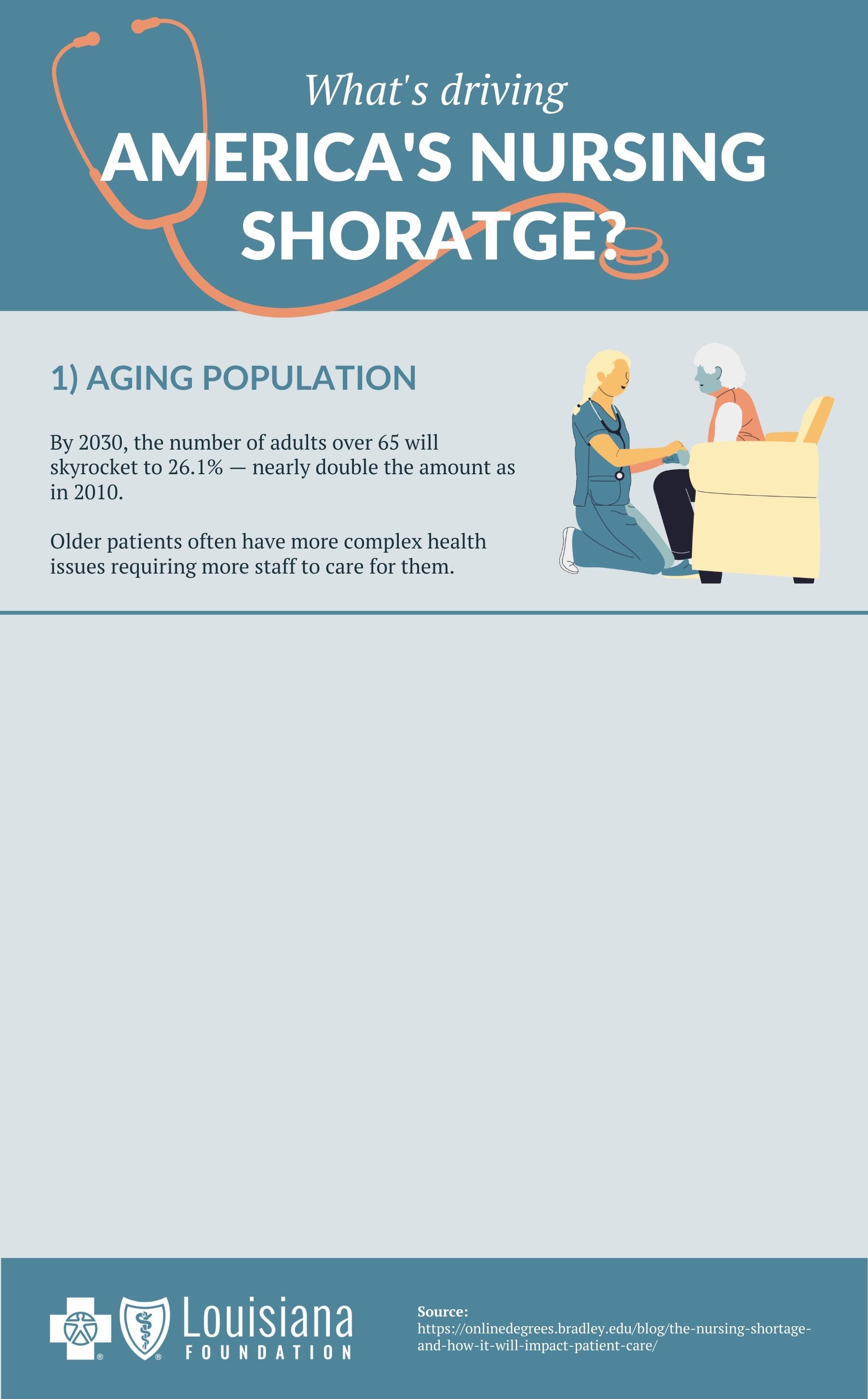
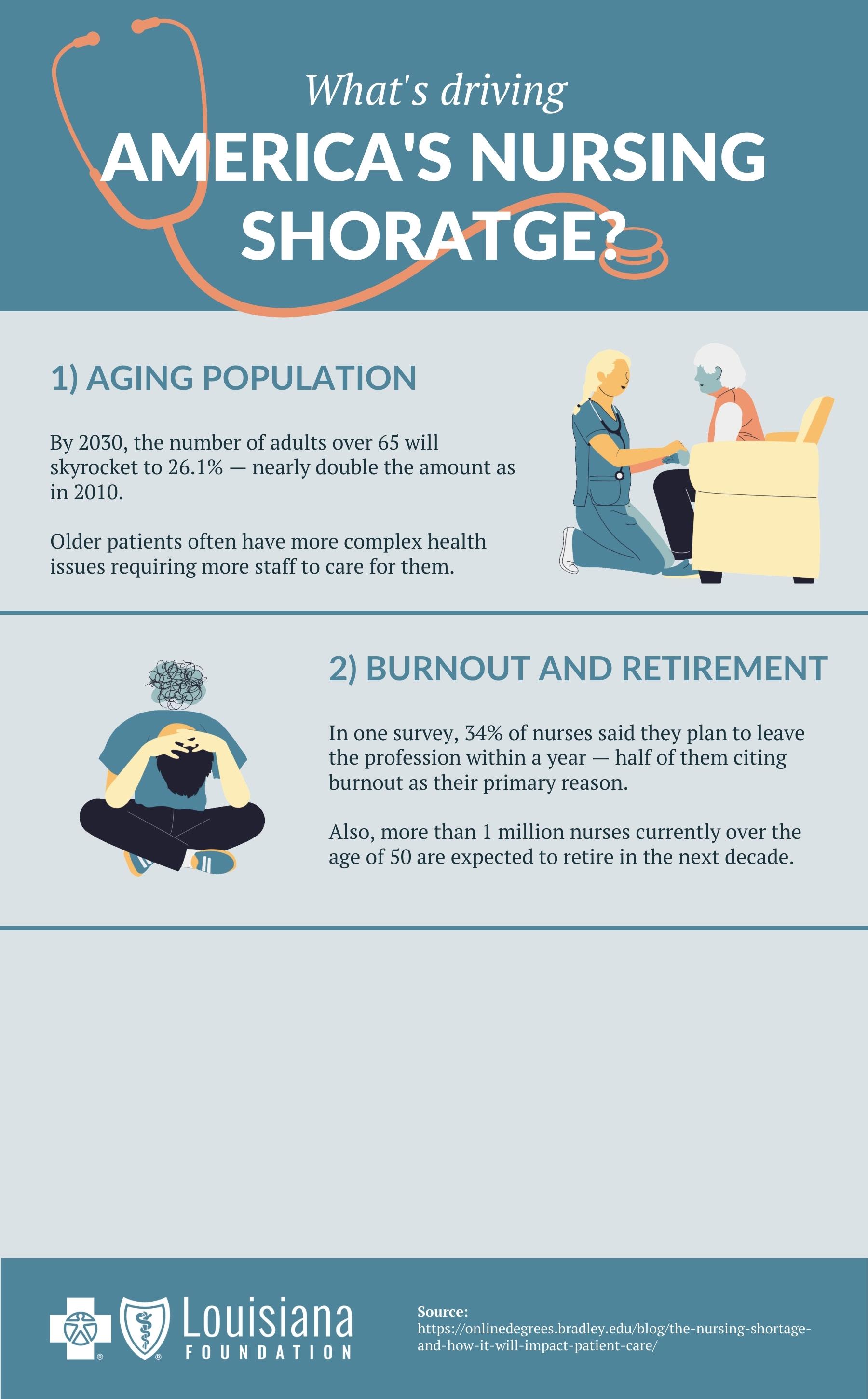
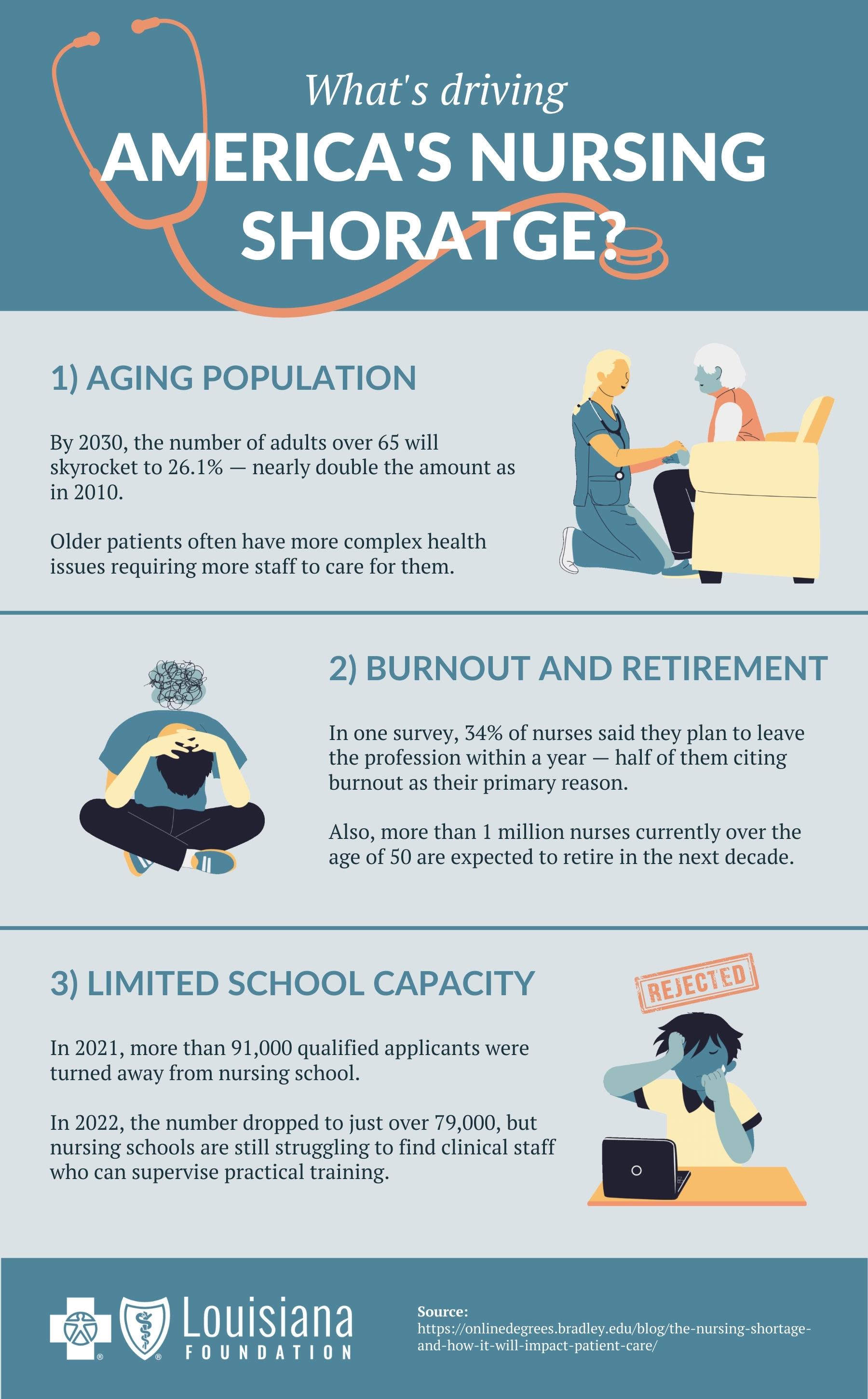

The Numbers Challenge
"It's a numbers challenge, but on the instructor side" said Sherita Williams in a 2019 interview with the Blue Cross Foundation. Williams is a registered nurse and, at the time of the interview, was an assistant nursing professor at Louisiana Delta Community College (LDCC) in Monroe, Louisiana.
"Ultimately, we can only accept as many students in the classroom as we have clinical instructors for their on-the-job training. The clinical ratio, which is State board-mandated, is 10 students to one faculty member. So when we take the students to clinical, we have to have a qualified faculty member to accept the students. There just weren't enough," she said.
LDCC is part of the Northeast Louisiana (NELA) Nursing Adjunct Faculty Initiative, a coalition of hospitals and nursing schools that found its solution in breaking down silos and sharing staff — a surprising move in an industry where recruiting is highly competitive.
The NELA Nursing Adjunct Faculty Initiative is a project of the region's Healthcare Alliance and Workforce Development Board 83, which is led by Executive Director Terri Mitchel.
"We have a number of industry workgroups who come together to talk about challenges, particularly around staffing. In meeting with members of the NELA Healthcare Alliance, it became clear that some of the barriers were bigger than any one hospital or college could solve — but when they worked together and pooled resources, the solution could be developed," Mitchel said.
"The initial idea that was on the table was to lobby the Louisiana State Board of nursing to increase the ratio of students to clinical instructors — perhaps 1 to 15. But the nursing schools wanted to ensure the highest quality instruction for their students in clinical training, so they offered an alternative."
Typically, clinical rotations happen during daytime shifts — a time when most nurses with master's degrees are treating patients and wouldn't be able to monitor students.
Rather than lobby for a change in law, Mitchel's colleagues saw a much simpler solution: first, schedule clinical rotations in the evenings and on weekends; second, allow qualified nurses from any hospital to serve as adjunct university faculty and lead clinical rotations.
"Everyone felt this was the best solution. It gave students more options, it allowed nurses to pick up some extra pay. The universities pay the nurses for their clinical rotations, and it's been really successful," Mitchel said.
Since launching in 2018, the NELA Nursing Adjunct Faculty Initiative has recruited 17 registered nurses to serve as adjunct faculty across the region, and is on track to graduate an additional 160 new nurses by 2025.
Watch our 2019 profile of the NELA Nursing Initiative.
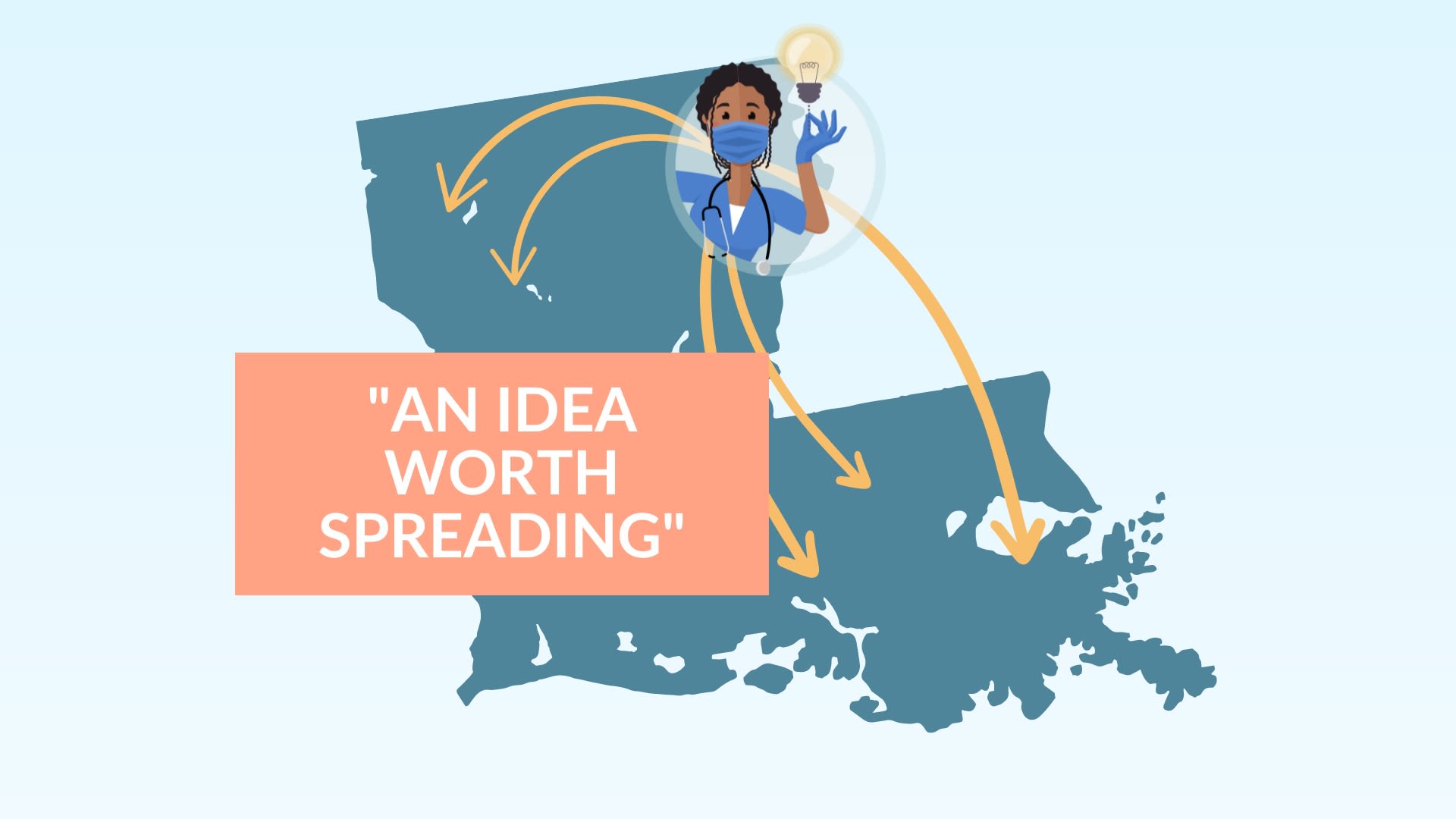
An Idea Worth Spreading
The success of the NELA Nursing Initiative and similar programs has spurred collaborations to train more nurses across Louisiana. Philanthropic investments by funders like the Blue Cross Foundation have helped accelerate extra capacity in the training pipeline.
"When the Workforce Development Board approached us about funding their regional nursing initiative, it was a very bold and simple plan," said Michael Tipton, president of the Blue Cross Foundation.
"I don't mean that we thought pulling it off would be simple — but that all of the partners involved had a spirit of willingness and collaboration to push past the traditional boundaries between them to just get it done."
The Foundation, which has funded more than $100 million in public health initiatives since its founding in 1995, has seen many complex, large-scale plans to address tough challenges, according to its grants officer, Chloé Wiley:
"There are many people around the state with powerful ideas, but sometimes they seem to doubt whether they can attract grant dollars. The temptation is throw a lot of bells and whistles into the core concept to push it farther."
"[The NELA Nursing Initiative] was a very bold and simple plan...I don't mean that we thought pulling it off would be simple — but that all of the partners involved had a spirit of willingness and collaboration to push past the traditional boundaries between them to just get it done."
"In this case, all of the partners had a direct, simple approach and have stayed true to their vision. They said, 'We need some extra resources to be able to hire and coordinate these extra adjunct faculty. Are you willing to invest in us?'"
The answer was yes, and after seeing the initial success of the program, Tipton and Wiley believed it could work in other regions. "We saw the impact and knew it was an idea worth spreading," Tipton said.
The Blue Cross Foundation's staff regularly works with partners across the state who are looking for best practices and field-tested solutions to complex challenges. Tipton has determinedly advocated for the NELA Nursing Initiative model when consulting with public health, education, and community leaders throughout Louisiana.
In just a few years, the Foundation has received proposals from and funded similar programs in nearly every region of the state, including:
- Fletcher Technical Community College in Schriever
- Louisiana State University at Alexandria
- Louisiana State University at Eunice
- Northwestern State University in Natchitoches
- Loyola University New Orleans
- Southern University at New Orleans
Fletcher Technical Community College (FTCC) was the first educational institution to apply directly to the Foundation for grant funding for its nursing program. FTCC added its own innovative spirit to the model.
"Our Fletcher team attended Blue Cross’ annual convening of community partners and were excited by the presentation from Monroe. The information provided immediately made sense in relation to how we were trying to address a shortage of nursing faculty in our own region,” said Dr. Kristine Strickland, chancellor of Fletcher Technical Community College.
“Once you become a licensed registered nurse, many institutions know that nurses are really busy and they offer continuing education online. However, there are very few programs that offer pre-licensure education outside of an in-person, daytime classroom setting. Our goal is to train more nurses by offering opportunities to provide education on a schedule and in a format that works for these students too — especially as so many potential students are already working full-time or multiple jobs to support their families,” she added.
In total, the Blue Cross Foundation has funded more than $5.1 million in grants addressing shortages in the healthcare workforce since 2019. Through these efforts, it hopes to see an additional 800 nurse-graduates enter Louisiana's workforce within the next few years.
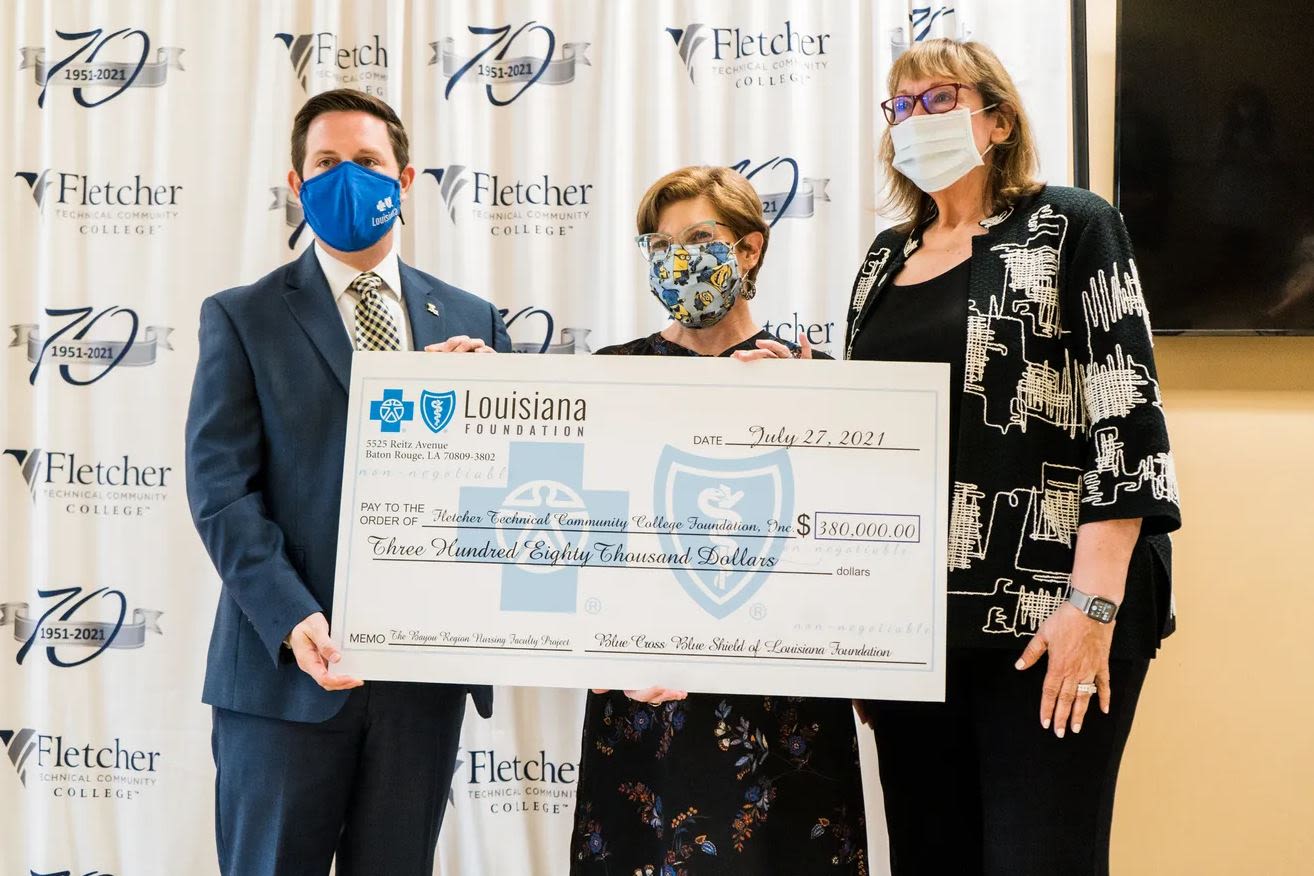
Blue Cross Foundation president Michael Tipton, Fletcher Chancellor Kristine Strickland, and Fletcher Foundation Chairwoman Marguerite Knight pose with a check at a grant announcement for FTCC's nursing program.
Blue Cross Foundation president Michael Tipton, Fletcher Chancellor Kristine Strickland, and Fletcher Foundation Chairwoman Marguerite Knight pose with a check at a grant announcement for FTCC's nursing program.
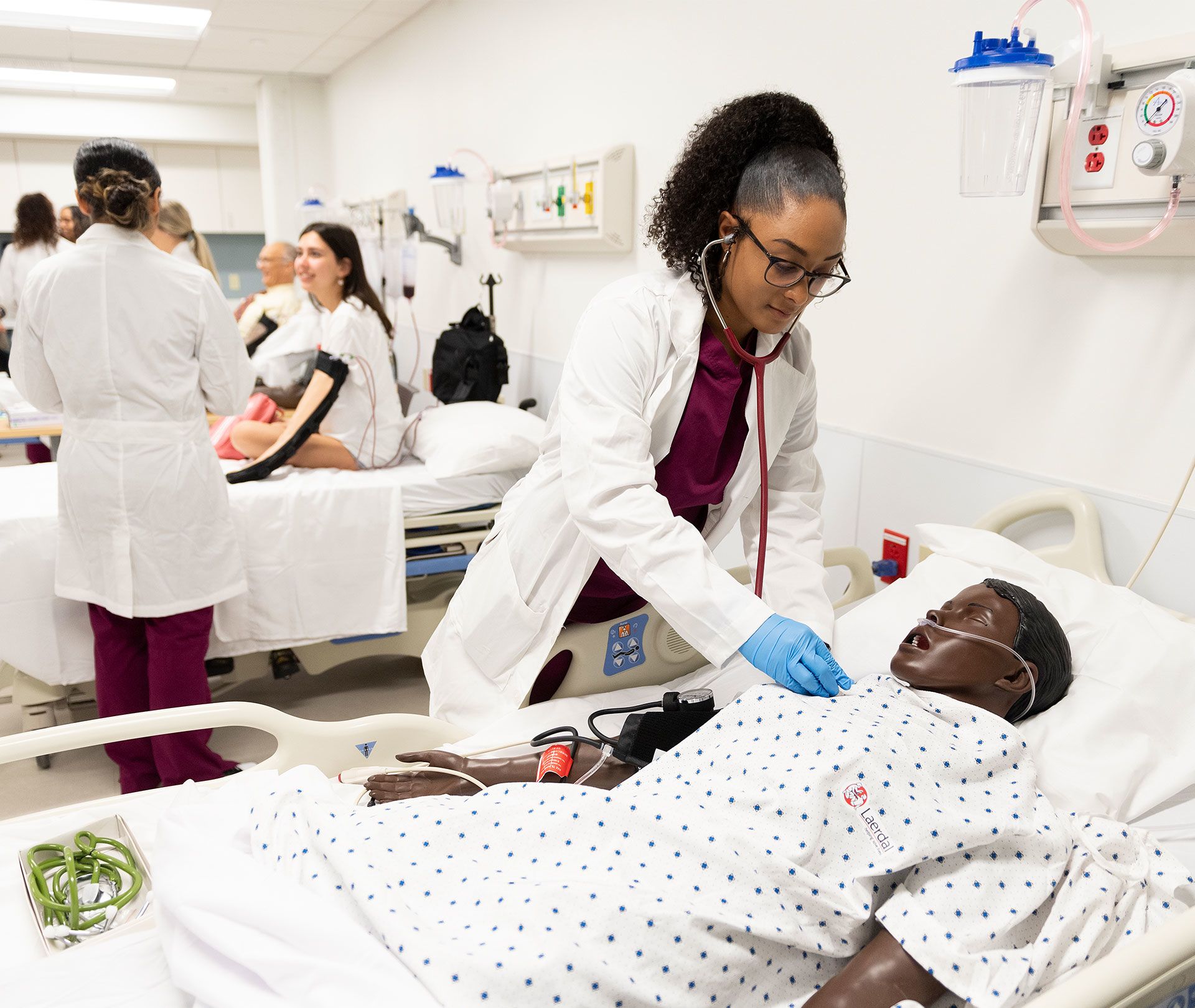
Nursing students at Loyola University New Orleans practice on a patient simulation to prepare for clinical training, an essential step to becoming licensed as a registered nurse.
Nursing students at Loyola University New Orleans practice on a patient simulation to prepare for clinical training, an essential step to becoming licensed as a registered nurse.
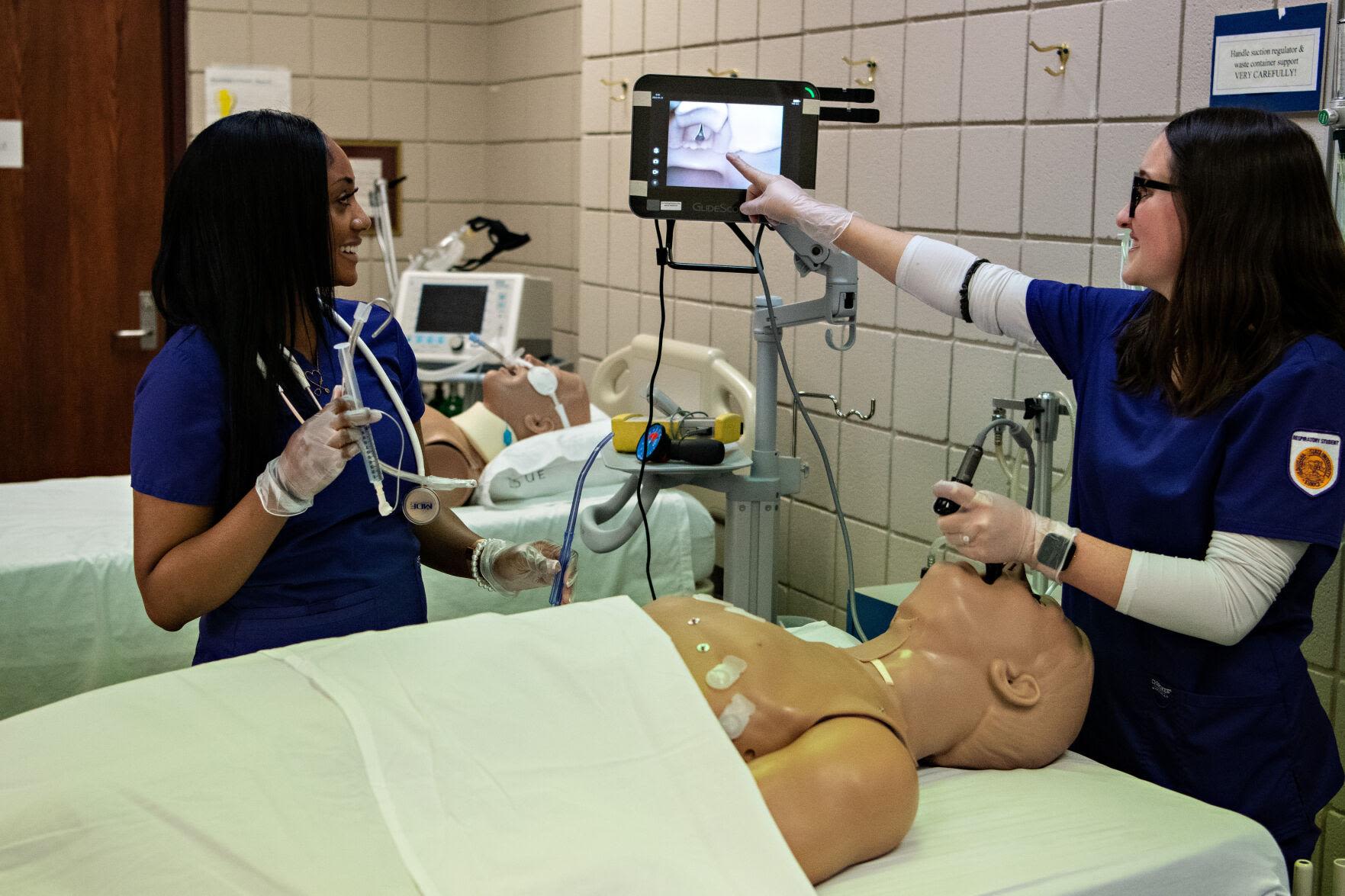
Nursing students at LSU Eunice test equipment while training to participate in clinicals.
Nursing students at LSU Eunice test equipment while training to participate in clinicals.
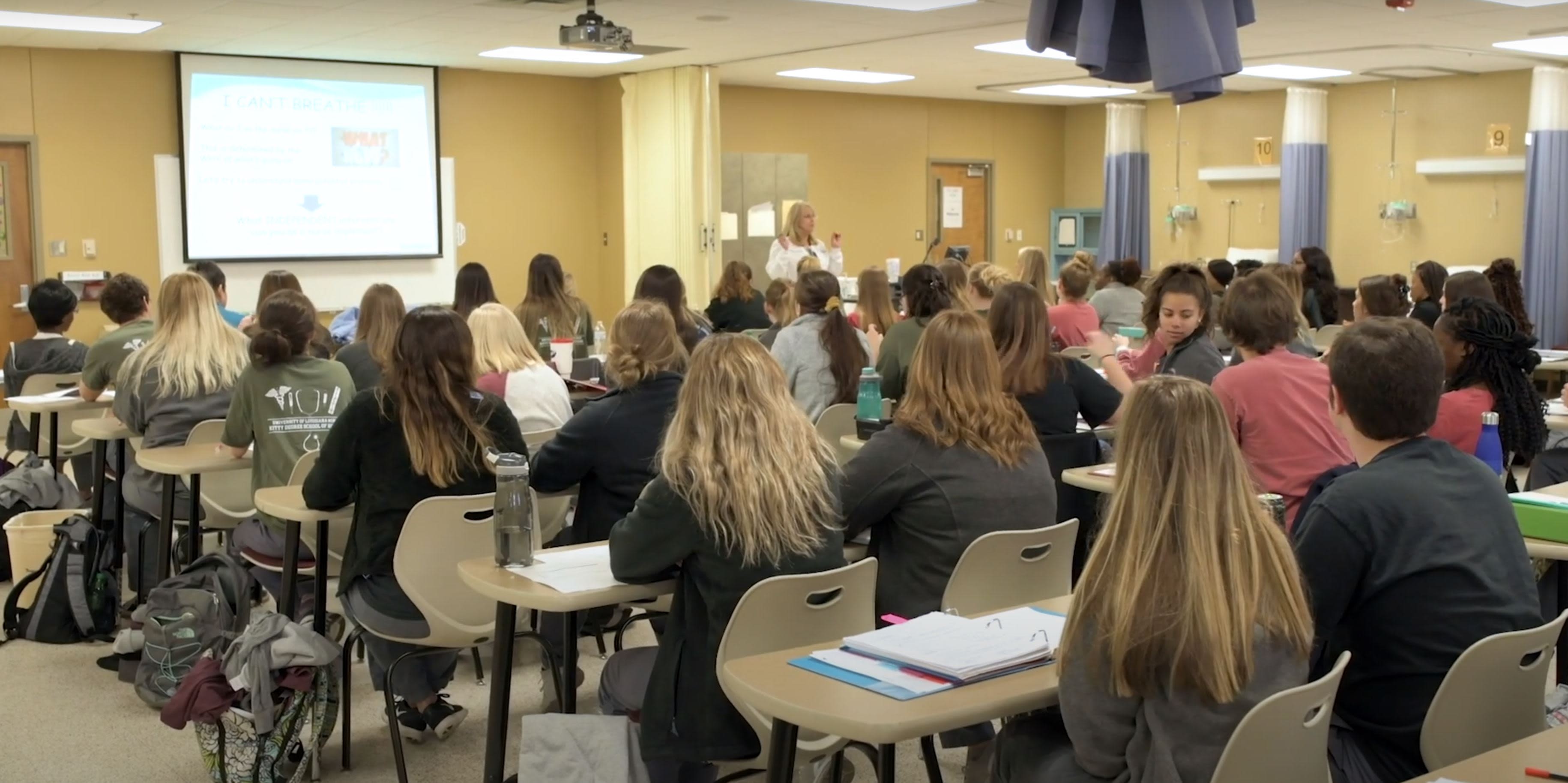
Across Louisiana, nursing programs at colleges and universities like Louisiana Delta Community College are able to accept more students with novel solutions funded by the Blue Cross Foundation.
Across Louisiana, nursing programs at colleges and universities like Louisiana Delta Community College are able to accept more students with novel solutions funded by the Blue Cross Foundation.
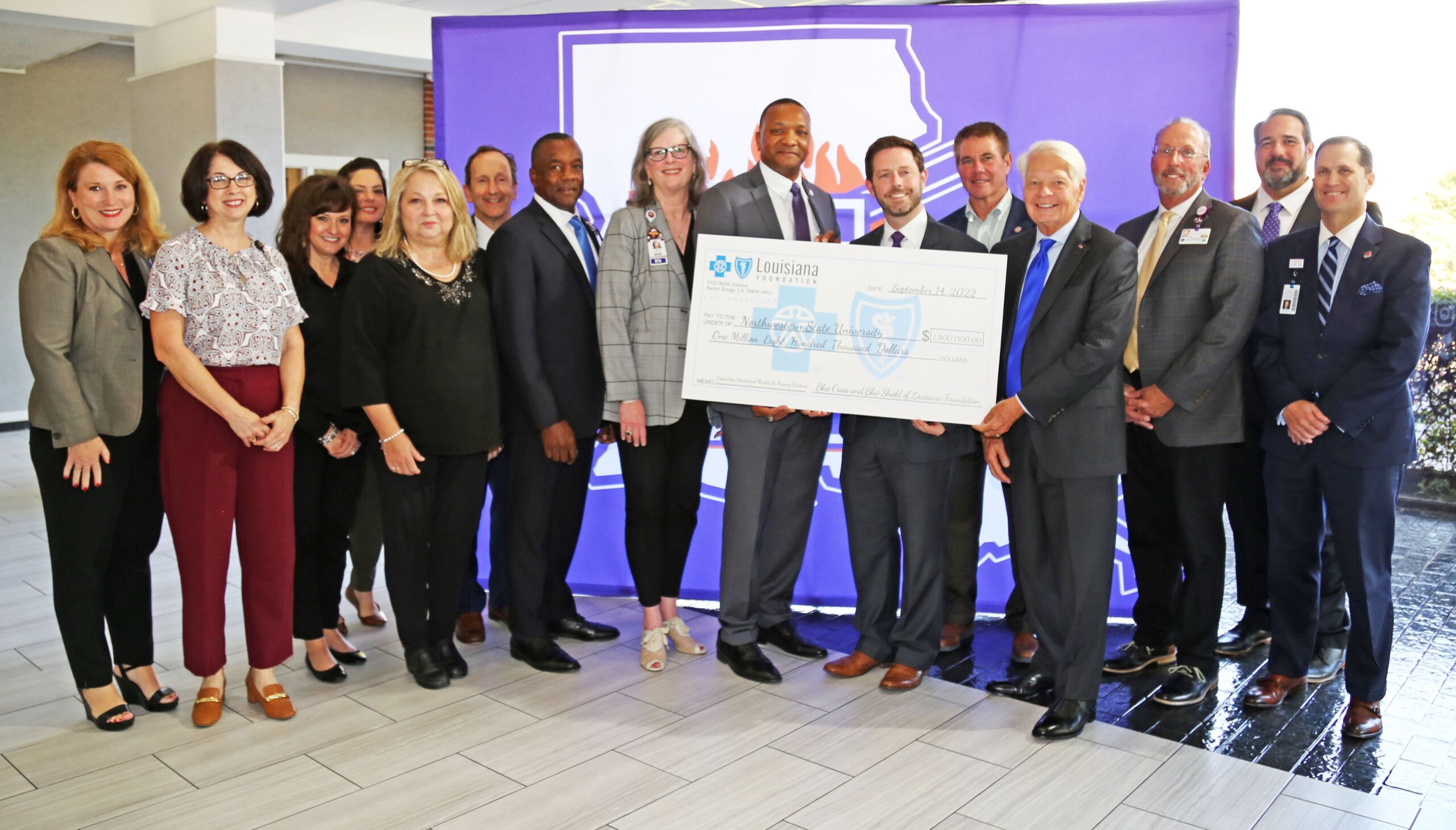
Faculty, staff, and administration officials from Northwestern State University pose with representatives from the Blue Cross Foundation at a grant announcement.
Faculty, staff, and administration officials from Northwestern State University pose with representatives from the Blue Cross Foundation at a grant announcement.
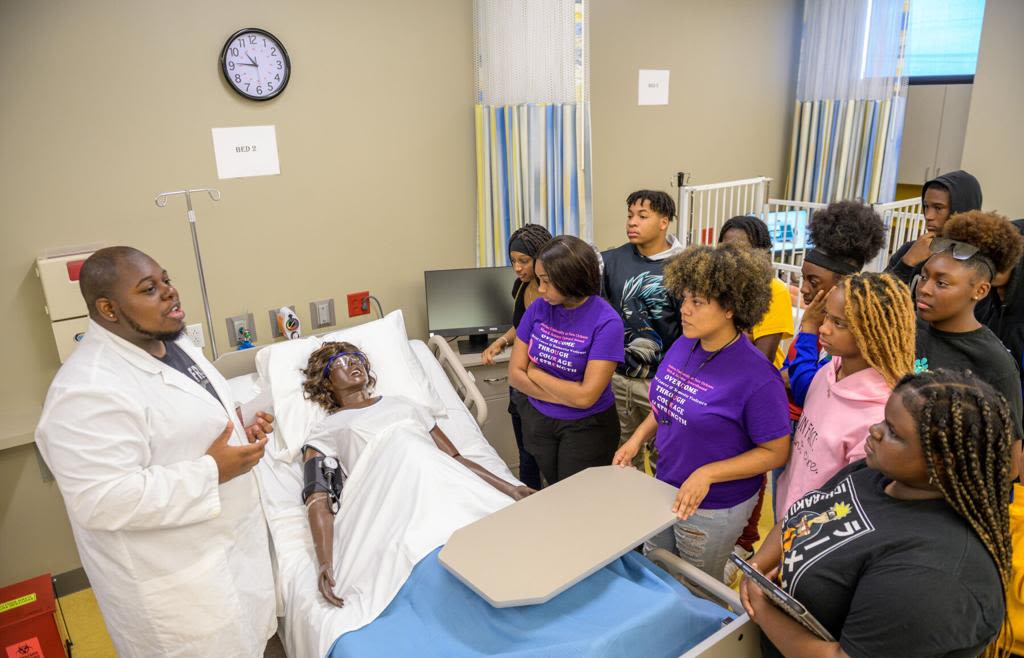
Potential candidates for Southern University at New Orleans' nursing program get a tour from nursing student Christopher Jolivette II.
Potential candidates for Southern University at New Orleans' nursing program get a tour from nursing student Christopher Jolivette II.
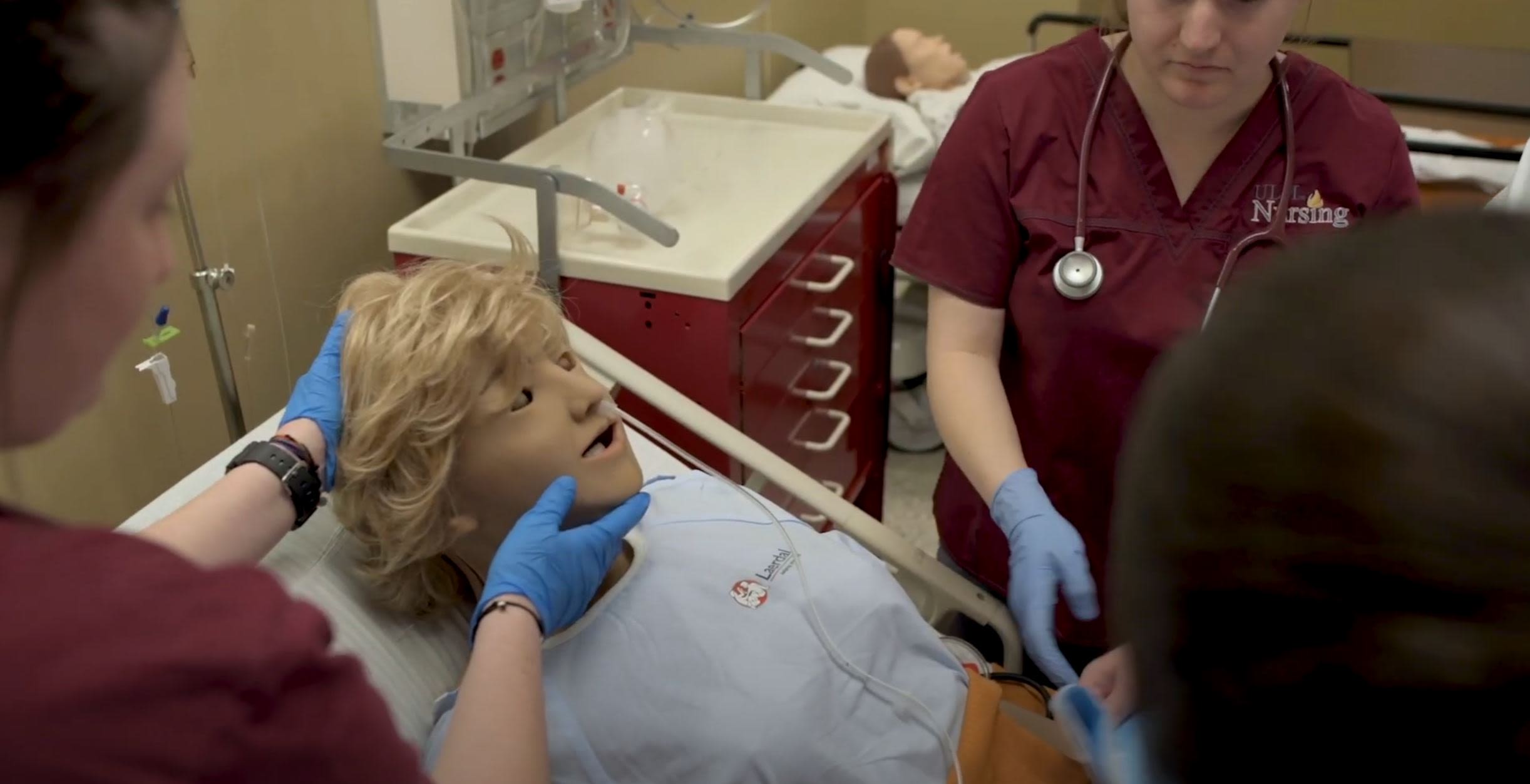
Students at University of Louisiana at Monroe practice with a patient simulator.
Students at University of Louisiana at Monroe practice with a patient simulator.
An Idea Worth Spreading
The success of the NELA Nursing Initiative and similar programs has spurred collaborations to train more nurses across Louisiana. Philanthropic investments by funders like the Blue Cross Foundation have helped accelerate extra capacity in the training pipeline.
"When the Workforce Development Board approached us about funding their regional nursing initiative, it was a very bold and simple plan," said Michael Tipton, president of the Blue Cross Foundation.
"I don't mean that we thought pulling it off would be simple — but that all of the partners involved had a spirit of willingness and collaboration to push past the traditional boundaries between them to just get it done."
The Foundation, which has funded more than $100 million in public health initiatives since its founding in 1995, has seen many complex, large-scale plans to address tough challenges, according to its grants officer, Chloé Wiley:
"There are many people around the state with powerful ideas, but sometimes they seem to doubt whether they can attract grant dollars. The temptation is throw a lot of bells and whistles into the core concept to push it farther."
"[The NELA Nursing Initiative] was a very bold and simple plan...I don't mean that we thought pulling it off would be simple — but that all of the partners involved had a spirit of willingness and collaboration to push past the traditional boundaries between them to just get it done."
"In this case, all of the partners had a direct, simple approach and have stayed true to their vision. They said, 'We need some extra resources to be able to hire and coordinate these extra adjunct faculty. Are you willing to invest in us?'"
The answer was yes, and after seeing the initial success of the program, Tipton and Wiley believed it could work in other regions. "We saw the impact and knew it was an idea worth spreading," Tipton said.
The Blue Cross Foundation's staff regularly works with partners across the state who are looking for best practices and field-tested solutions to complex challenges. Tipton has determinedly advocated for the NELA Nursing Initiative model when consulting with public health, education, and community leaders throughout Louisiana.
In just a few years, the Foundation has received proposals from and funded similar programs in nearly every region of the state, including:
- Fletcher Technical Community College in Schriever
- Louisiana State University at Alexandria
- Louisiana State University at Eunice
- Northwestern State University in Natchitoches
- Loyola University New Orleans
- Southern University at New Orleans
Fletcher Technical Community College (FTCC) was the first educational institution to apply directly to the Foundation for grant funding for its nursing program. FTCC added its own innovative spirit to the model.
"Our Fletcher team attended Blue Cross’ annual convening of community partners and were excited by the presentation from Monroe. The information provided immediately made sense in relation to how we were trying to address a shortage of nursing faculty in our own region,” said Dr. Kristine Strickland, chancellor of Fletcher Technical Community College.
“Once you become a licensed registered nurse, many institutions know that nurses are really busy and they offer continuing education online. However, there are very few programs that offer pre-licensure education outside of an in-person, daytime classroom setting. Our goal is to train more nurses by offering opportunities to provide education on a schedule and in a format that works for these students too — especially as so many potential students are already working full-time or multiple jobs to support their families,” she added.
In total, the Blue Cross Foundation has funded more than $5.1 million in grants addressing shortages in the healthcare workforce since 2019. Through these efforts, it hopes to see an additional 800 nurse-graduates enter Louisiana's workforce within the next few years.







Rebuilding Louisiana's nursing workforce provides an opportunity to re-examine the systemic barriers and challenges that have kept a more diverse candidate pool from working in healthcare.
In America, only 17 percent of nurses identify as people of color. In Louisiana, that number is as low as 11 percent — compared to the 40 percent of the state's population who identify as Black, Latino, or Asian.
A 2014 study in JAMA Internal Medicine found that Black nurses are critical for providing Black communities with improved healthcare. In a report aggregating research on representation in the workforce, the University of Illinois Urbana-Champaign writes, "Compared to their white counterparts, [Black nurses] are more likely to practice in underserved areas that comprise a large percentage of Black families and are more likely to accept patients who are covered by Medicaid. However, improving access to care is only one dimension of how they serve their community—they also have been linked to improving the quality of care that African Americans receive."
Improving Louisiana's overall public health relies on diversifying its healthcare workforce. But Black and Latino students face a litany of challenges, including cultural perceptions and financial hurdles.
"In the [healthcare] industry, there's not a lot of people who look like me. People don't see women, especially Black women, and automatically assume, 'Oh, she wants to be a doctor, oh she wants to be a neurosurgeon,'" said Mackenzie Wilson, a medical assistant who is studying to be a neurosurgeon at Meharry Medical College in Nashville, Tennessee.
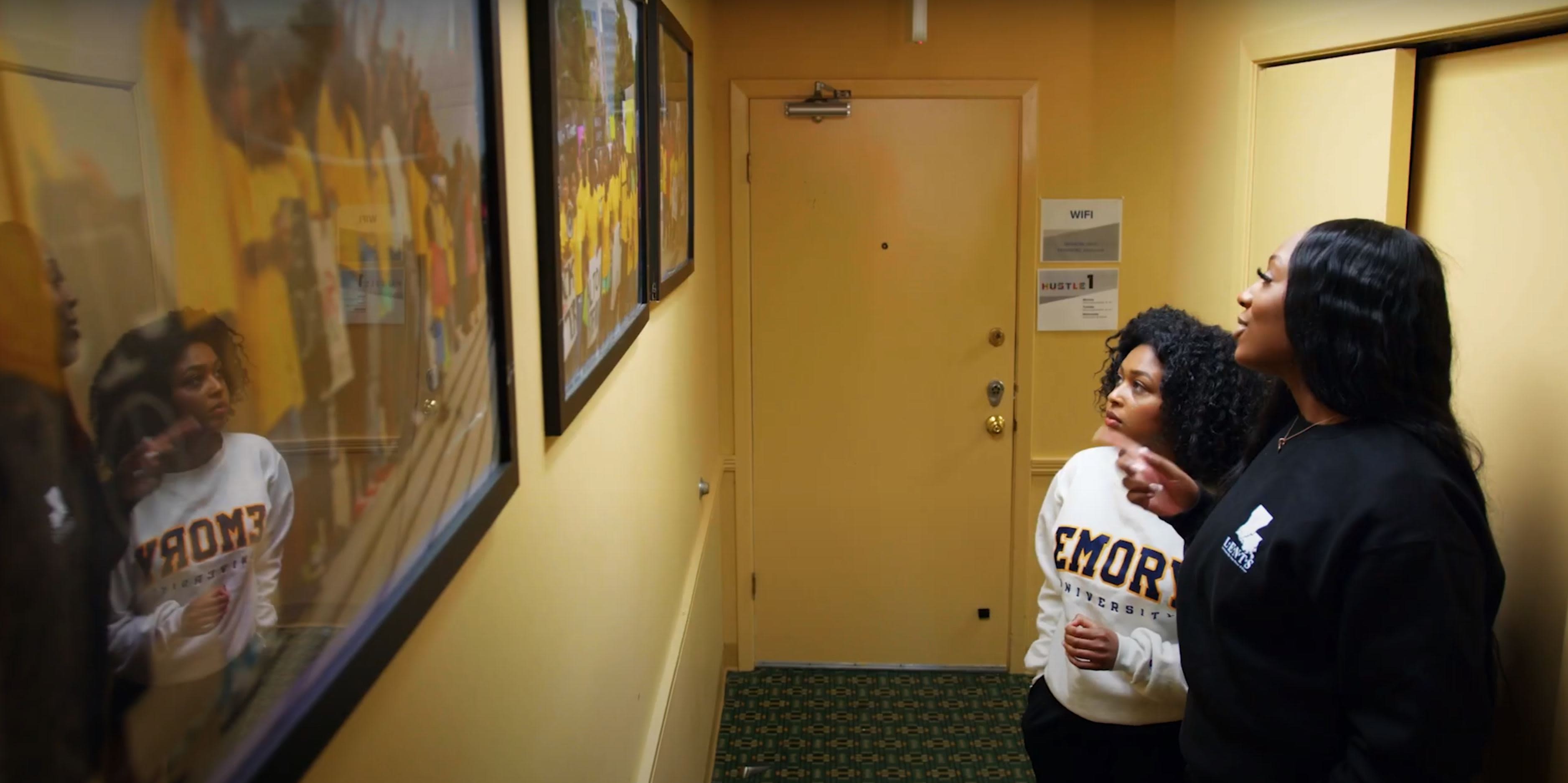
Mika Cooper and Mackenzie Wilson prepare for a study session at the Baton Rouge Youth Coalition (BRYC). Both are graduates of BRYC's Health Fellows program and are pursuing careers in healthcare.
Mika Cooper and Mackenzie Wilson prepare for a study session at the Baton Rouge Youth Coalition (BRYC). Both are graduates of BRYC's Health Fellows program and are pursuing careers in healthcare.
Wilson is a graduate of the Baton Rouge Youth Coalition's Health Fellows program, which provides scholarships and academic support to students working to enter the healthcare industry. The Health Fellows is one of several strategic investments by the Blue Cross Foundation in diversifying the future healthcare workforce.
"When you're a person of color or you're coming from a low-income background, which is where a lot of the BRYC Fellows come from, it can be difficult. How can you be successful if the resources you have available are the best that you can do, but they're not getting you the results that you need?" said Mika Cooper, another BRYC alumni who is also studying for medical school.
A deeper look at the Baton Rouge Youth Coalition's Health Fellows program.
Nursing education programs with an interest in graduating more Black and Latino students have taken notice and are providing support to help students stay in school when unexpected life events or financial pressures might otherwise delay or end their career aspirations.
Southern University at New Orleans (SUNO) houses one such program, led by Dr. Kelly Smith, the founding chair of SUNO's Department of Nursing. SUNO, a historically Black college and university (HCBU) offers scholarships, mental health services, and mentoring to its nursing students.
Watch our 2023 profile of SUNO's nursing program to learn more.
"We exist to help address health inequities and disparities among minorities by admitting students that represent the community that will be served. We can't move the needle if we can't understand the patient," she said.
"Our region needs more nurses quickly. Each student normally takes up to six years to graduate. With the kind of support we're able to provide with the Blue Cross grant, we can reduce the amount of time it takes them to graduate," added Dr. Murty S. Kambhampati, a SUNO professor of biology.
"The support is very helpful. It eases everything else so you can focus on your academics or whatever else you're trying to achieve," said Cooper.
For the Blue Cross Foundation, the road is long, but the path is clear: to improve health outcomes, Louisiana needs a trained, diverse, and culturally competent healthcare workforce. That work will take time and sustained investment, says the Blue Cross Foundation's president — but it will mostly hinge on collaboration.
"It's inspiring to see communities take this challenge on with such rigor. Having so many partners focused on one goal and working together across the state is the template for how we move ourselves forward," said Tipton.
"It's a reminder to me that sometimes the best work we can do, aside from granting funds, is to create spaces for people to connect and share good ideas — but then get out of their way and let them succeed," he added.
"As a nurse, we have the opportunity to heal the mind, soul, heart, and body of our patients. They may forget your name, but they will never forget how you made them feel."
- Maya Angelou


Credits:
- Ben Mahoney, Blue Cross and Blue Shield of Louisiana Foundation - Copy & Design
- James Peck, The Pixel House - Original Photography and Video Profiles
Sources:
- Louisiana Radio Network, 6,000 nursing positions are available as Louisiana faces nurse shortage
- Reuters, One-third of US nurses plan to quit profession, survey shows
- American Association of Colleges of Nursing, Nursing Schools See Enrollment Increases in Entry-Level Programs, Signaling Strong Interest in Nursing Careers
- Zippia, Registered Nurse Demographics and Statistics in the US
- JAMA Internal Medicine, Minority Physicians’ Role in the Care of Underserved Patients
- University of Illinois Urbana-Champaign, Exploring the 10 Percent: Why Black Nurses are Imperative
